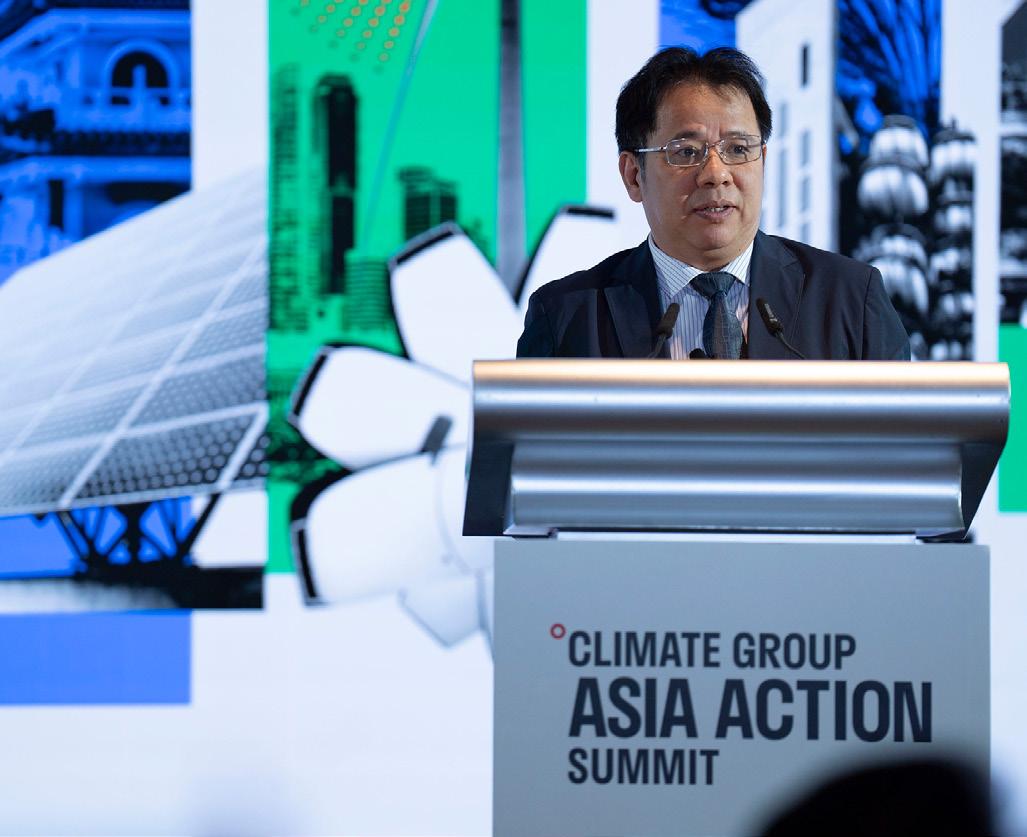Time It’s

Highlights from the













The impact of AI and data centres. Clean tech. The importance of data tracking. The influence of Green Electricity Certificates in China, Europe’s CBAM, and grid interconnections. And even talk of a sustainable century that will define Asia.
The breadth and depth of the discussions at our second Climate Group Asia Action Summit was impressive - and I’d like to thank our partners, and you, for making it into such a success.
With well over 300 delegates from all across the region and multiple sectors, the turnout surpassed our inaugural edition of 2023. But more importantly, there was a key sentiment I felt throughout the day: confidence.
Confidence that Asia is leading the charge in the transition and in innovation. Confidence in the longterm planning that governments and investors told us they are looking for. And confidence that, as one of our panellists said: in 15-20 years from now, only companies that are truly sustainable throughout their business and supply chains will survive.
Of course, that confidence came with the sobering realism that we’re not there yet - not even close. Two of the three biggest global emitters are in Asia. Data
and transparency need to improve. The investment in renewables needs to scale rapidly to meet the growing electricity demands and to phase out fossil fuels – and to ensure that countries across Asia have an evenly distributed access to those renewables.
So, it was encouraging to hear panellists from the investment sector in Asia say that despite the recent challenges, none of the companies they’re speaking to, are changing their climate strategies. None. Companies are staying the course.
That does give hope in these geopolitically challenging times. With trade disruptions and tariffs leading to economic uncertainty across the globe, it was good to feel some of the realistic confidence of this region. And to switch focus on the crisis that has been getting fewer headlines lately: the climate crisis.
With children and communities already suffering in heatwaves, floodings, hurricanes and polluted air, threatening their lives and hampering

countries’ economies, it’s important to discuss the realities of the crisis, and what solutions are at hand. To me, the day showed that Asia truly is ready to lead the transition, and that left me feeling positive. I hope you felt the same.
Thank you for setting that out so clearly. It was a privilege to bring you together.
Helen Clarkson OBE, CEO of Climate Group

RE100 announced China’s Green Electricity Certificates are now fully aligned with its technical requirementsa milestone signaling China’s leadership in renewable energy worldwide.

The Singapore Ministry of Trade convened to discuss the challenges and opportunities in accelerating Asia’s clean energy transition, highlighting the transformational benefit of a fully realised ASEAN power grid.

In a powerful keynote speech, Low Xin Wei, Assistant Chief Executive of Singapore’s Energy Market Authority, underscored the region’s global influence: “The way in which Asia sources [its] energy [...] and how we decarbonise, will shape not only our own trajectory, but that of the entire world.”

The Under2 Coalition held its first-ever regional meeting in Asia, bringing together subnational governments and partners from across the AsiaPacific to tackle shared climate challenges.

June Kunugi, UNICEF’s Asia Regional Director, highlighted the human stakes: “It’s been estimated that 7 million people die every year of causes related to air pollution [...] UNICEF have calculated that 100 children under five are dying every day from causes related to air pollution.”
This year’s agenda brought together speakers from across Asia and beyond to discuss opportunities, challenges and solutions for bolder climate action.
Asia is a region made stronger by its diversityin culture and economies, but also in countries’ experience and response to the climate crisis. The summit reflected this, featuring a wide range of voices from 24 countries, including Singapore, China, India, Japan, Taiwan, Indonesia, and Korea.
I’d like to congratulate Climate Group for inviting speakers who represent the diversity of views, from some of the major players that are not always part of the conversation.
Spencer Low, Head of Regional Sustainability, APAC, Google
Our 2025 speakers
• Ishika Mookerjee, Asia ESG & Climate Reporter, Bloomberg
• Ali Izadi-Najafabadi, Head of Asia-Pacific, Bloomberg NEF
• Jose Ordonez, Chief Revenue Officer & Managing Director APAC, CDP
• Yuechun Yi, First Deputy Director-General, China Renewable Energy Engineering Institute
• Dany Qian, Global Vice President, JinKo Solar
• Kimiko Hirata, Executive Director of Climate, Integrate
• Winston Chow, Professor of Urban Climate/Co-Chair WGII, Singapore Management University/Intergovernmental Panel on Climate Change
• June Kunugi, Regional Director, UNICEF, East Asia and Pacific Regional Office
• Gina Domanig, Managing Partner, Emerald Technology Ventures
• Deepali Khanna, Head of Asia, Rockefeller Foundation
• Spencer Low, Head of Regional Sustainability, APAC, Google
• Martijn Hoogerwerf, Head of Sustainable Solutions Group APAC, ING
• Steve Howard, Vice Chairman, Sustainability, Temasek
• Michael Wen, Executive Vice President, Cathay Financial Holdings
• Andre Oei, Director (Energy Partnerships Division), Ministry of Trade and Industry

• Low Xin Wei, Assistant Chief Executive (Markets & Systems Division), Energy Market Authority
• Harjeet Singh, Strategic Advisor, Fossil Fuel Non-Proliferation Treaty Initiative
• Bernard Tan, Country President (Singapore), Sinar Mas and Chairman, Golden Philanthropies, Sinar Mas and Golden Philanthropies
• Peter Bakker, President & CEO, World Business Council for Sustainable Development
• Stephen Stapczynski, Asia Energy, Team Leader, Bloomberg
• Jacob Li, Head of Climate Impacts Programs, Nova Complex
• Seonghoon Woo, CEO, Amogy
• Alain Mahieu, Director, Sustainability Solutions, ENGIE

Ishika Mookerjee, Asia ESG & Climate Reporter at Bloomberg, kicked off Part One of the Summit. The session united government, corporate, and third sector voices in a joint call for Asia to solidify its role as a global leader on climate.
Asia is at the heart of supply chains across the world, meaning corporate leadership will be critical in achieving net zero region wide and globally. Our expert speakers highlighted that companies in Asia are setting more ambitious climate targets and they’re enhancing transparency, but progress must accelerate to meet 2030 goals.

Let’s join hands to promote the sustainability of the global renewables industry.
Yuechun Yi, First Deputy Director-General, China Renewable Energy Engineering Institute

It
makes business sense for governments and regulators to adapt their grids to the new normal: renewables.
Sam Kimmins, Director of Energy, Climate Group

We’re facing two devastating crises at the exact same time and both are entirely manmade. One is economic, and one is climate.
Helen Clarkson, CEO, Climate Group
As the world’s largest energy consumer and emitter of greenhouse gas emissions, Asia must drive innovation to speed up the transition. This is the foundation of long term, green economic growth.
“25 million jobs can be created in the green sector by 2030 [...] 14 million can be generated In Asia alone.” - Harjeet Singh, Strategic Advisor, Fossil Fuel Non-Proliferation Treaty Initiative
With fewer than 1,700 days until 2030, the need for a clear and actionable regional roadmap is urgent. Steve Howard, Vice Chairman of Sustainability at Temasek,

Collaborating can reduce the cost of the transition and create new opportunities. The areas for collaboration will wildly vary, but fundamentals around the economic benefits remain the same for all.
Ali Izadi Najafabadi, Head of Asia Pacific, Bloomberg NEF
offered a rallying cry: “This is a century which is built for sustainability.”
In response to the question of how Asia can become the new standard bearer for the climate movement, Kimiko Hirata, Executive Director at Climate Integrate warned: “We cannot afford to say that we missed the opportunity after the adoption of the Paris Agreement 10 years ago.”
Leaders are recognising the vital role of publicprivate partnerships to unlock speed, innovation, and scale. Panelists stressed that real climate progress depends on inclusive, community-based partnerships - especially for vulnerable populations.


Part three
The final part focused on Asia’s technological and financial advantages— and how the region can harness them to lead the global climate technology and innovation race.
One message was clear: the green tech outlook for Asia is extremely positive. The region has become a global hub for climate innovation, developing scalable, cost-effective solutions across multiple sectors. Despite global economic uncertainties, long-term strategies from tech companies and investors continue to embrace strong climate ambition.
All stakeholders - from government, industry, to financial institutions - can work together to gradually achieve the mission.
Michael
Wen, Executive Vice President, Cathay Financial Holdings


The closing session turned the focus to the critical enabler— finance. It’s increasingly clear that ambition to drive action means little without funding. Speakers explored balancing financial returns with sustainable development, de-risking green energy projects, and the role of philanthropy in supporting the region’s green transition.


The roundtable sessions saw impactful closed-door conversations between senior leaders from across business, government and the third sector, focusing on real-world action.
Corporate leadership on energy efficiency: How can companies get the COP28 pledge back on track?
Companies - with their capital, expertise, and innovation – need to take the lead in pushing efficiency up the policy agenda and driving national decarbonisation efforts. Participants identified priority messages and strategies to bring to COP30, including the role of AI and collaborative action in achieving energy goals.
Enhancing India’s climate ambition: Unlocking a sustainable future
As India prepares its third NDC, participants explored how to raise ambition while balancing development, climate impact, and economic growth. They discussed policy frameworks, finance, and global partnerships that could position India as a clean energy leader.
CBAM is here: How do we restructure the relationship between production and emissions?
With the EU’s Carbon Border Adjustment Mechanism (CBAM) on the horizon, Asian manufacturers face pressure to align emissions with global trade standards. This session focused on how companies are adapting supply chains, investing in low-carbon tech, and preparing for regulatory shifts.
Moving toward 24/7 CFE: How to advance APAC’s energy transition
In partnership with Google, this roundtable explored how companies can accelerate the shift to 24/7 carbon-free energy (CFE) in the APAC region. The session delved into how companies can identify procurement gaps, foster partnerships, and advance the next frontier of clean energy leadership.



The Under2 Coalition held its first regional meeting in Asia, bringing together subnational governments and partners from across the region to tackle shared climate challenges, showcase ambitious leadership, and accelerate the transition to net zero.
Subnational governments are key to achieving global climate goals—particularly in Asia-Pacific, where extreme weather events are becoming devastatingly frequent. Often the first responders to these crises, many are driving innovation to cut emissions and build resilience, despite limited resources. With greater access to tools and funding, they are ready to do even more.
During the meeting, subnational leaders shared bold energy transition targets, including a commitment to 100% renewable energy by 2045, and emphasised the importance of just transition funding for communities impacted by the phaseout of fossil fuel-based jobs.
Financing emerged as a key theme, with calls for greater access to mechanisms like green bonds, carbon markets, and subnational climate funds. Participants also shared innovative methane reduction strategies, including satellite monitoring and cross-sector partnerships. Local adaptation efforts in India, including land restoration and sustainable agriculture, were also discussed.
This year marks the 10th anniversary of the Under2 Coalition. The inaugural Asia regional meeting was the first in a global series of regional ministerials, celebrating a decade of subnational climate leadership and our ongoing commitment to driving action through collaboration, implementation, and impact on the ground.

This year’s Climate Group Asia Action Summit brought together over 80 members from across Climate Group’s initiatives to address regional challenges and opportunities and drive collective impact.
Our global network includes 800 businesses, governments, and signatories showcasing their leadership through the commitments they’ve made to drive collective action and deliver a just transition.
Members of RE100, EV100, EP100, SteelZero, ConcreteZero, the 24/7 Carbon-Free Coalition, and the Under2 Coalition participated in roundtables, panel sessions, and Ministerials, to define pathways to accelerate the region’s transition to net zero.



Media
Outlets including The Straits Times, Business Times, Bloomberg, and Press Trust of India attended the Summit.
10+ pieces of coverage, including The Straits Times, Business Standard, and The Week

The Climate Group Asia Action Summit held on May 8 brought together business leaders and policymakers from across Asia to discuss how to stay competitive in a fast-changing world, how to reduce costs and swiftly unlock barriers, and where to spot opportunities.
Press Trust of India
Attendee split by sector
Attendee split by seniority















